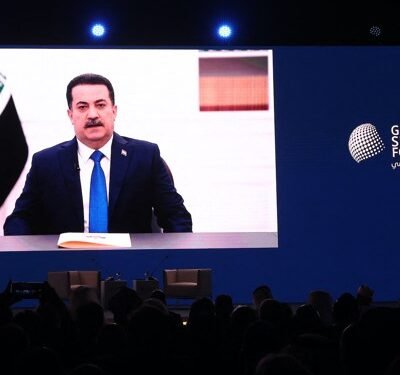Published in coordination with the 2024 Global Security Forum, of which Defense One is a media partner.
Despite all the goodwill between Washington and Baghdad, future bilateral ties will likely be shaped by terrorism and Iranian-backed proxies.
I’ve long been concerned that a pivot to great power competition could overcorrect U.S. attention and resources away from counterterrorism priorities, and indeed it has. Still, the rebalancing of U.S. national security focus can’t be binary; it is not an either-or proposition. We must focus on counterterrorism and on global competition, while leveraging allies as strategic partners. Fortunately, any setbacks in Iraq can be reversed by strengthening U.S. counterterrorism ties with Baghdad.
The principle of strategic empathy promoted by retired general and former White House national security advisor H.R. McMaster may show how the U.S.-Iraqi partnership can weather the difficulties of today’s competition. Iraq’s political and human terrain requires Prime Minister al-Sudani to navigate multifaceted security challenges and combustible internal pressures—exacerbated by Iranian proxies and their influence. The U.S., on the other hand, must view Baghdad diplomacy through a prism of Iraq’s political geography, particularly in the kind of high-stakes competition that is playing out across the Middle East.
Leading up to his Washington engagements, Prime Minister al-Sudani lucidly expressed his understanding of the complexities of building a long-term sustainable partnership with the U.S. His region is beset by war, terrorism, proxies, and even sporadic hostage-taking. al-Sudani is keenly aware of the delicate balance Iraq must maintain between the U.S. and hostile armed groups, while at the same time seeking prosperity and security for the Iraqi people.
Unfortunately, malign Iranian behaviors, ISIS activities, and even hostage-taking by the pro-Iranian Shiite militia Kataib Hezbollah suggest that militia groups absorbed into Iraq’s security forces may have stronger links to Iran than to Iraq. Knowing this, Washington and Baghdad have to carefully manage their strategic relationship for the long haul.
Accordingly, strategic investments in the U.S.-Iraqi counterterrorism partnership must continue despite any setbacks. Of the many undercurrents with Iraqi stability and security, it’s crucial not to overlook the Iraqi Counterterrorism Service, or CTS. Maintaining and continuing support to the CTS is crucial to the U.S.-Iraqi relationship. The CTS is an organization built and supported by the U.S. and must remain an enduring strategic partner. Still, Iraq will need to protect its counter-terrorism structure against undue Iranian meddling and interference.
Notwithstanding all of the counterterrorism successes that Iraq and the U.S. have had in its fight against ISIS, the coalition arrayed against ISIS has not beat it decisively. Yet, both President Biden and Prime Minister al-Sudani recognize that Iraq must have U.S. support to ensure that ISIS can never again reconstitute to threaten Iraq, the international community, or the U.S.
Commentators were not entirely wrong to suggest that Iran’s retaliatory strike against Israel overshadowed Iraqi Prime Minister al-Sudani’s visit to Washington. The week-long visit this past April was supposed to focus on expanding bilateral ties, and new economic opportunities for investments, not an escalating regional war. But that’s the salutary point: Iraq’s importance, even if uncomfortably wedged in between warring states, has long term potential to bring much-needed stability to a region needing it.
Prime Minister al-Sudani also made time to meet with the family of Kayla Mueller, on the sidelines of his official U.S. visit. Mueller was kidnapped and killed in 2015 by ISIS terrorists in Syria while working on humanitarian relief. The Mueller family requested the Iraqi government’s assistance in conducting an investigation that could lead to the recovery of their daughter’s remains. Prime Minister al-Sudani expressed a willingness to launch such an investigation. This development is an encouraging step forward.
In light of all that is at play in Iraq, a bilateral strategic partnership is more important now than ever. That should be the take away from Prime Minister al-Sudani’s visit to Washington. But more than anything else, terrorism and proxies will remain a spoiler for well-intended policy objectives. A vibrant counterterrorism partnership with the U.S. is the appropriate counterweight.
But the danger of escalation in Iraq remains. Just one day after al-Sudani returned from the U.S., Iraq’s Kataib Hezbollah said armed groups had decided to resume its attacks after noting little progress on talks held on U.S. troop presence during al-Sudani’s visit to Washington.
So, in terms of hostage-taking and counterterrorism going forward, the United States and Iraq have three key considerations:
First, Washington should signal its long-term commitment to Iraq by deepening its understanding of their complex security challenges and acknowledging the tensions between sovereignty and a continuing, mutually beneficial counterterrorism partnership with the United States.
Second, Baghdad can signal the strategic importance of CTS and ensure that the service is not politicized or infected by Iranian meddling. Along with this, Iraq’s security and intelligence services must create a security environment where no foreigners are kidnapped in Baghdad, and where hostage-takers are brought to justice.
Third, as Dr. Matthew Levitt presciently observed, maintaining a sound counterterrorism posture is the antithesis of “endless wars in terms of size, cost, and risk, and should be pursued in support of international coalitions and local allies.” With counterterrorism partnerships ending abruptly in places like Chad and Niger, Iraq must remain a U.S. priority.
To hedge, in counterterrorism, is to make smart investments for the future that reduces the risks of more instability and terrorism. A smart, appropriately scoped, long-term counterterrorism partnership in Iraq is therefore a bet worth making.
Christopher P. Costa is a member of The Soufan Center board of directors and an adjunct associate professor with Georgetown University’s Security Studies Program, Walsh School of Foreign Service. He is a former career intelligence officer and was special assistant to the president and senior director for counterterrorism at the National Security Council from 2017 to 2018.









